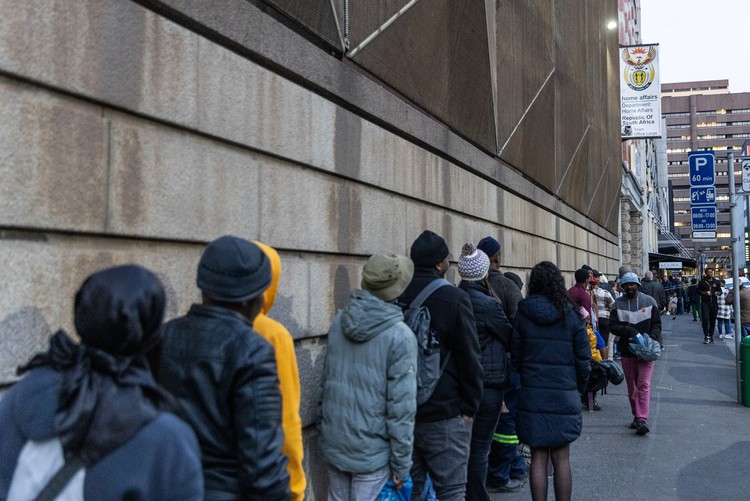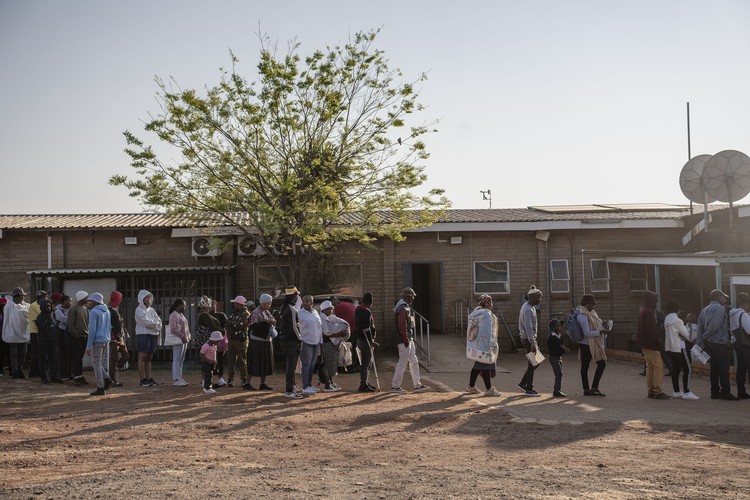Queue, the beloved country
We have come to accept that we must queue for hours for every public service - but it’s not normal
People queue from early in the morning outside Home Affairs in Cape Town. Photo: Ashraf Hendricks
Fourteen hours.
That’s how much time I spent queuing to renew and collect my passport and to get a new ID card.
That was time I would have much rather spent with my family or at work.
It involved three trips to Home Affairs in Wynberg. The first time I queued on the pavement outside Maynard Mall from 4:45am in the dark. I was 11th in the queue at that point. But spare a thought for the man in front of me. His house had burnt down. So he had to organise new IDs and birth certificates for his wife and his six children. He had become a regular at Home Affairs. So much so, that he knew to come with a little portable chair to sit on, and his laptop so he could work while waiting in the queue.
He helped me alleviate the boredom of waiting by explaining the numerous ways to optimise one’s Home Affairs experience, from how to navigate the flaky online booking system, to which times of day to come, to the pros and cons of travelling to an out-of-town branch, instead of one of the city offices, or of using a bank.
He was an expert in dealing with Home Affairs. If there was a university degree for this, he’d have a PhD.
For the most part, with an exception or two, the staff inside Home Affairs on my three visits were courteous. (Though there was an incident where an older woman got barked at for standing in the wrong place.)
But many of us seemed to experience glitches that were beyond our control. In my case, I was told that my expiring passport had not been checked out properly from Barrack Street Home Affairs in 2015. This meant I had to wait in a special queue. A long-suffering public servant patiently helped each of us “problem cases”, changing wrong entries on a computer system, making phone calls, signing forms and performing other obscure bureaucratic tasks. When he got to me, I commiserated with him about how tough his job seemed. He opened up, telling me that every Friday, after work, he has to have a bottle of whisky to cope with the coming week.
And, of course, it is not just at Home Affairs that people queue. Some social grant beneficiaries have to spend the whole night queuing outside SASSA offices. People queue for hours to get their UIF claims processed, to get attention at a public clinic or hospital, to see a human at SARS, or, in many places, to vote.
People queue for social grants in Orange Farm, Johannesburg. Photo: Ihsaan Haffejee
At some police stations, you have to queue for hours to report a theft. And that’s just to get a case number for an insurance claim; there’s not the slightest chance of the police properly investigating most crimes.
And then there’s the court system, where even the simplest cases can take years to be finalised, with magistrates and judges nearly always granting postponements for the flimsiest of reasons.
In South Africa we have come to accept that dealing with any part of the public service usually means giving up most of a day or night, sometimes several days. We have found life-hacks to beat the system: you can get the Home Affairs online booking system to give you an appointment if you try at exactly this time, explained one commenter online when I looked up why I couldn’t get the system to work. If you have a car, you can drive to a small town hours away where the queues are much shorter.
It’s not okay to have to wait in the dark from early in the morning, for much of the day, to get access to an essential public service. It’s not okay to wait years for a court case to be resolved.
I don’t know how to fix this mess. But we shouldn’t accept it as normal.
Support independent journalism
Donate using Payfast

Don't miss out on the latest news
We respect your privacy, and promise we won't spam you.
© 2025 GroundUp. This article is licensed under a Creative Commons Attribution-NoDerivatives 4.0 International License.
You may republish this article, so long as you credit the authors and GroundUp, and do not change the text. Please include a link back to the original article.
We put an invisible pixel in the article so that we can count traffic to republishers. All analytics tools are solely on our servers. We do not give our logs to any third party. Logs are deleted after two weeks. We do not use any IP address identifying information except to count regional traffic. We are solely interested in counting hits, not tracking users. If you republish, please do not delete the invisible pixel.


